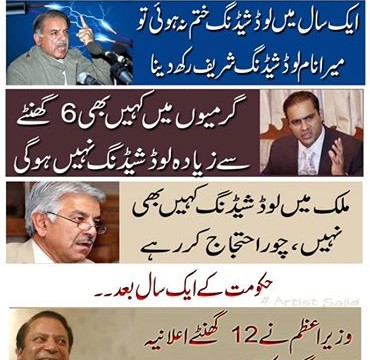Playing another trick, the government has conveyed to the people to be ready to brave two more years of the energy crisis. The latest date for the end of load shedding has been announced as 2017 by Minister for Water and Power Khawaja Asif. Since the start of the 2013 election campaign, the Pakistan Muslim League-Nawaz (PML-N) has been giving the lollypop of dates about the resolution of the energy crisis. First it was three months, then it was extended to six months, later one year and now it has been deferred till the end of their regime. Even if the government lives up to its word regarding the latest date, it will be a great achievement of the PML-N that has made itself a laughing stock due to its leadership’s changing statements about the timeframe for ending the energy crisis. Khawaja Asif’s renewed confidence to end load shedding by the end of 2017 emanated from the recent signing of agreements with China. He has said that Pakistan and China had signed contracts for 8,320 MW projects worth $ 20 billion investment, which would be completed between 2018 and 2020. By accepting China’s offer to play a role in Pakistan’s economic development, the government has put a lot at stake. The setting up of the China-Pakistan Economic Corridor (CPEC) requires serious efforts on the part of the PML-N government. Amid so many other crises, it cannot afford to disappoint Chinese investors who are taking a great risk in making investment in Pakistan.
The government should not fool the people through employing jugglery of words. Rather it should be practical in its approach. Along with the announcement of projects, the government should also reveal the mechanism that would be applied for the achievement of their ambitious goals. There should be planning in sequence. Along with the announcement of new projects, the government needs to overhaul the existing outdated national grid, which cannot sustain the increasing load of electricity. The energy crisis has already created havoc in the lives of the people with electricity outages of 10 to 12 hours a day in many parts of the country. It is high time that the government should make some concerted efforts to end this crisis. The government needs to treat the cause, not symptoms. It should focus on upgrading the power infrastructure and make efforts for better recovery of power utility dues. The electricity suppliers should cut off power supply to all those government ministries, departments and institutions that do not pay their energy bills. Without treating all consumers, government or private, in the same manner, the crisis will not be resolved. Without tackling the energy crisis in a holistic and effective manner, Pakistan’s future looks literally gloomy.

No comments:
Post a Comment